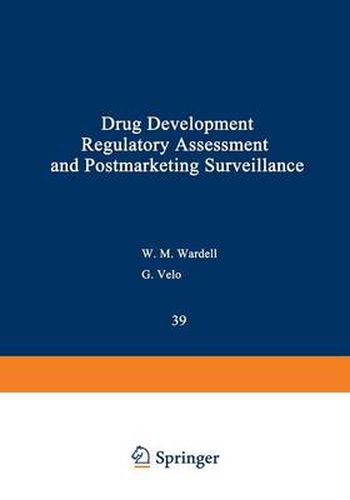Readings Newsletter
Become a Readings Member to make your shopping experience even easier.
Sign in or sign up for free!
You’re not far away from qualifying for FREE standard shipping within Australia
You’ve qualified for FREE standard shipping within Australia
The cart is loading…






This title is printed to order. This book may have been self-published. If so, we cannot guarantee the quality of the content. In the main most books will have gone through the editing process however some may not. We therefore suggest that you be aware of this before ordering this book. If in doubt check either the author or publisher’s details as we are unable to accept any returns unless they are faulty. Please contact us if you have any questions.
This volume is the outcome of the International School of Phar macology course sponsored as a NATO Advanced Study Institute and held in Erice (Sicily) at the Ettore Majorana Centre for Scientific Culture from October 3 through 12, 1980. The course, which consisted of lectures and teaching seminars, examined issues of international importance in all phases of drug development, assessment, and regu lation. In order to recreate both the atmosphere and substance of the meeting, a variety of materials are included here: the papers pre sented by the lecturers, a selection of key items from the supple mentary materials provided by the lecturers to the participants, notes on issues raised during the discussions, and accounts of certain special sessions arranged in response to interests expressed by those attending. The course covered two broad areas represented here by parts of the book. Part I, Drug Assessment and Regulation, is based on the nine sessions of the course that ranged in focus from recent developments in the science of clinical pharmacology and drug development to discussions of whether and how the regulation of drug development can (or should) be harmonized internationally. In Part 11, Postmarketing Surveillance, many aspects of this important subject are presented. Arguments outlining the potential benefits of national and international postmarketing surveillance systems are qualified by consideration of the problems inherent in devising and using these systems.
$9.00 standard shipping within Australia
FREE standard shipping within Australia for orders over $100.00
Express & International shipping calculated at checkout
This title is printed to order. This book may have been self-published. If so, we cannot guarantee the quality of the content. In the main most books will have gone through the editing process however some may not. We therefore suggest that you be aware of this before ordering this book. If in doubt check either the author or publisher’s details as we are unable to accept any returns unless they are faulty. Please contact us if you have any questions.
This volume is the outcome of the International School of Phar macology course sponsored as a NATO Advanced Study Institute and held in Erice (Sicily) at the Ettore Majorana Centre for Scientific Culture from October 3 through 12, 1980. The course, which consisted of lectures and teaching seminars, examined issues of international importance in all phases of drug development, assessment, and regu lation. In order to recreate both the atmosphere and substance of the meeting, a variety of materials are included here: the papers pre sented by the lecturers, a selection of key items from the supple mentary materials provided by the lecturers to the participants, notes on issues raised during the discussions, and accounts of certain special sessions arranged in response to interests expressed by those attending. The course covered two broad areas represented here by parts of the book. Part I, Drug Assessment and Regulation, is based on the nine sessions of the course that ranged in focus from recent developments in the science of clinical pharmacology and drug development to discussions of whether and how the regulation of drug development can (or should) be harmonized internationally. In Part 11, Postmarketing Surveillance, many aspects of this important subject are presented. Arguments outlining the potential benefits of national and international postmarketing surveillance systems are qualified by consideration of the problems inherent in devising and using these systems.